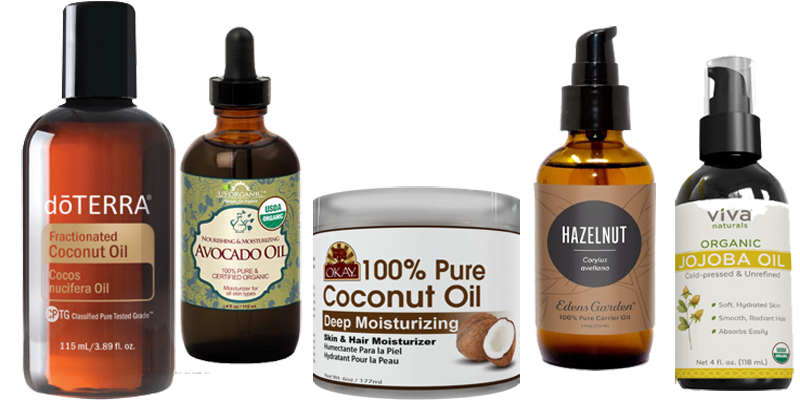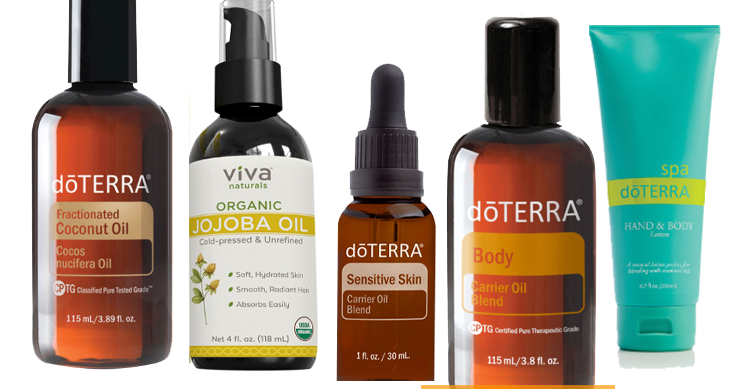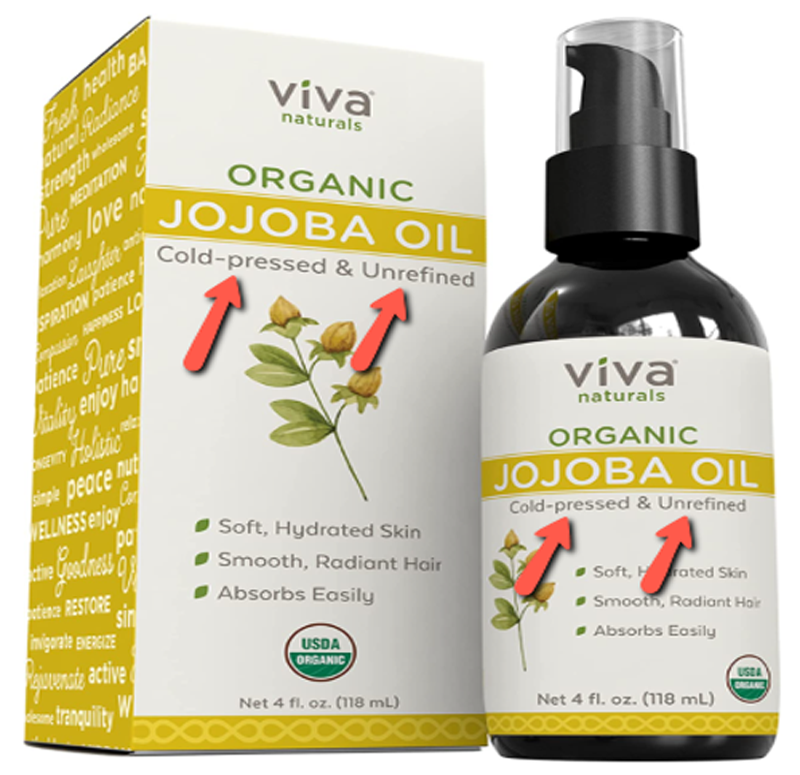SUBSCRIBE TO MY FREE ESSENTIAL OILS NEWSLETTER, "THE ESSENTIAL OILS Rx"
Carrier Oils and Their Benefits
 Some Common Carrier Oils
Some Common Carrier OilsWhat are Carrier Oils
When essential oils are applied directly to the skin, they can sometimes cause irritation, or burning.
This is especially true for “hot” oils like peppermint and oregano, or when an essential oil is applied to sensitive or damaged skin. Diluting the essential oil before applying it reduces the likelihood of such skin irritation (For more information on diluting essential oils see my page, How to dilute essential oils).
Because essential oils are true oils, they do not mix well with water and need to be diluted with another oil. The oils used for this purpose are known as carrier oils because they are thought to help “carry” the essential oil into the skin. They also improve absorption of the essential oil: using a carrier oil can improve the absorption of the essential oil by as much as 10%.
But carrier oils can benefit skin even without the addition of essential oils. In this article I review some of the general benefits of carrier oils. To learn more about the benefits of specific carrier oils click on this link.
TIP
Using a carrier oil with an essential oil can improve the absorption of that essential oil by as much as 10%.
How Carrier Oils Benefit the Skin

Carrier oils are vegetable oils derived from the seeds, kernels or nuts of a plant. They are loaded with essential fatty acids and vitamins that help nurture skin health and promote healing,
Different carrier oils have different characteristics and benefits. As a result, some are more suitable for certain skin types than others.
Fractionated coconut oil, for instance, is a thin oil that does not clog pores and is suitable for use on all skin types whereas regular coconut oil is comedogenic and best used on areas of the body other than the face.
Purchasing Carrier Oils
When purchasing a carrier oil you want look for the words "cold pressed" and "unrefined".
Cold pressing is the process in which the oil is obtained by pressing or crushing a plant without subjecting it to heat. This preserves the bioactive substances in the oil.
Refining, on the other hand, uses heat and solvents to extract oils. This can damage the oil, not only destroying its beneficial components but resulting in the formation of free radicals which are damaging to skin.
The word “Organic” on the label ensures that no pesticides were used in producing the plants from which your oils are extracted, but it says nothing about how the oil was processed.
The word “pure” generally means there are no added ingredients but the oil can still be of low quality.
Purchasing Tip
When purchasing a carrier oil look for the words "cold-pressed" and "unrefined". The word "organic" means the plant the oil came from was grown without pesticides but says nothing about how the oil was processed and the word "pure" simply means there are no added ingredients - but the oil may still be of low quality.
Storing Carrier Oils

Carrier oils are not volatile so they will not evaporate like essential oils will. But most of them will oxidize over time. So, like essential oils, they should be kept in a dark bottle, and stored in a cool place away from both heat and light.
Different oils oxidize at different rates so their shelf lives vary. Adding vitamin E oil to a carrier oil will help stabilize the oil and prolong its shelf life.
As with essential oils, keeping carrier oils in refrigerator will also slow oxidation and help extend their shelf life.
STORAGE TIP
Adding vitamin E to a carrier oil will help protect it from oxidation and prolong its shelf life. Keeping the oil away from light and heat will also help prolong the shelf life of a carrier oil.
Marketing Tips

If you are selling essential oils out of your office you are going to want to be able to offer your patients one or more carrier oils . I suggest. . .
- Fractionated Coconut Oil. Fractionated coconut oil is the most commonly used carrier oil. It is suitable for all skin types and has a very long shelf life. If you are only going to sell (or use) only one carrier oil, this is the one I would choose.
- Jojoba Oil. If you have patients with acne prone skin you might also consider offering them jojoba oil. Jojoba oil, which is actually an ester or wax rather than an oil, reduces excess production of sebum, a property that makes it especially useful on oily or acne prone skin.
You also might want to consider offering two blended doTERRA carrier oils, as well as a lotion for those who prefer to dilute their oils using a cream or lotion rather than an oil. doTERRA's blended carrier oils include. . .
- Sensitive Skin Carrier Blend. As its name implies, this carrier blend, which combines Grape Seed, Rosehip Seed, Hemp Seed, Sunflower Seed and Vitamin E oils, is specially formulated for use on sensitive skin. This is a thicker oil that can also be used as a stand-alone moisturizer.
- Body Oil Carrier Blend. This blend contains Jojoba Oil, Sunflower Seed Oil and the unusual oils of Passion Fruit, Baobab, and Moringa, as well as vitamin E oil . It's great for those looking for total body moisturization or who want apply an essential oil to larger areas of their body.
- Hand and Body Lotion In addition to fractionated coconut oil and the oil blends mentioned above, doTERRA also offers this fragrance free lotion intended to blend with a favorite essential oil.
- Pre-blended Hand Lotions. In addition to the Hand and Body Lotion mentioned above, doTERRA also offers two lotions that have already been combined with essential oils. These include Citrus Bliss Hand Lotion, a blend of Sunflower and Macadamia Seed Oils combined with the essential oil blend Citrus Bliss and Rose Hand Lotion which combines a hydrating hand lotion with rose essential oil.
Next in the Series on Essential Oil Basics...

Which Oils to Use as Carrier Oils: Several different oils can be used as carrier oils, and each has their own set of benefits. To learn about the benefits of some of the more commonly used carrier oils click on this link.

Want to try doTERRA essential oils or essential oil products?
Click on this link to get a FREE membership and WHOLESALE prices for a full year! Get My Free doTERRA Membership.






